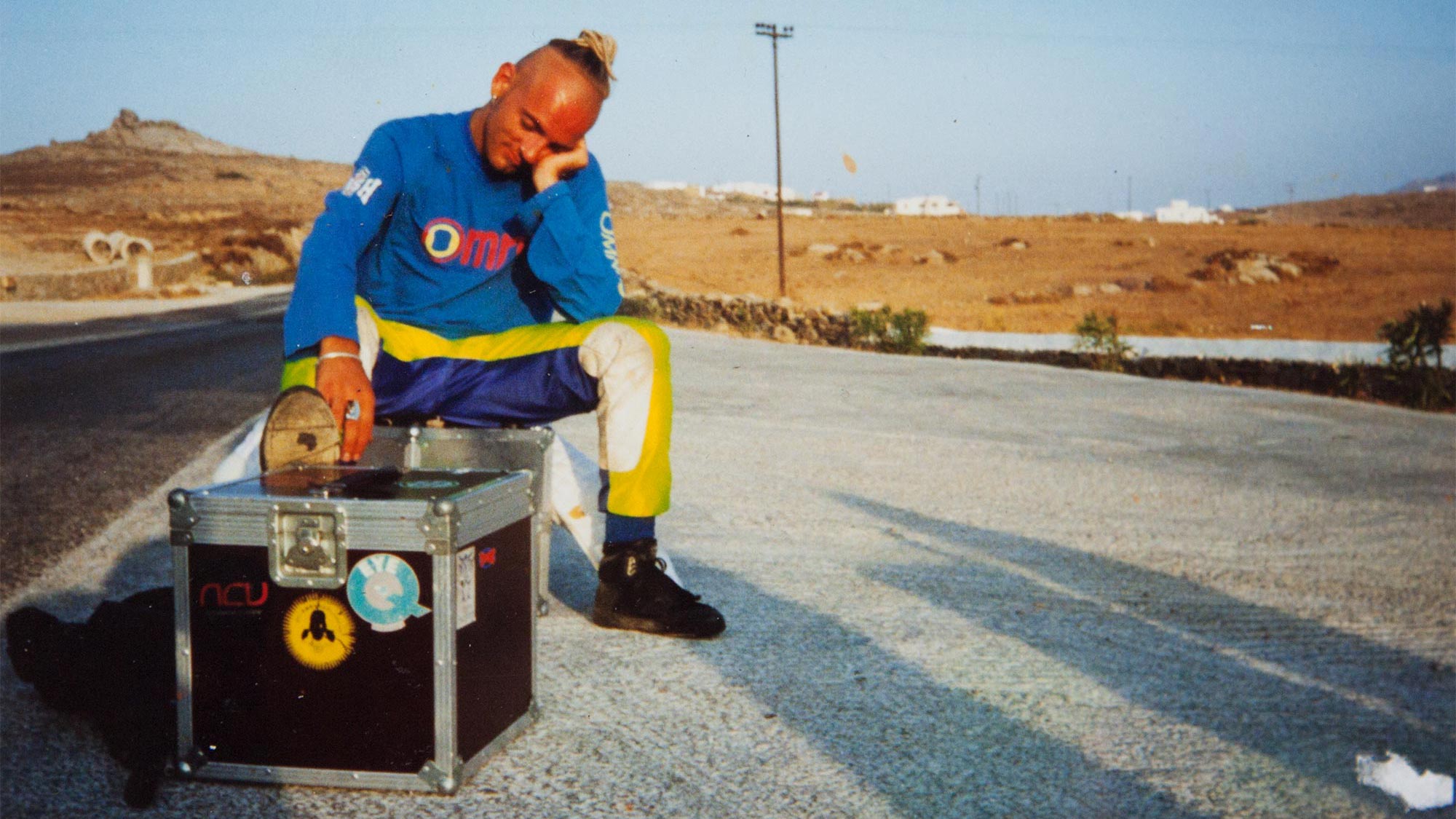All Photos: Archive Sven Väth/ Cocoon.
Click here for the German version of the interview.
This summer Sven Väth celebrated his 20th Ibiza season. As a curious teenager Väth visited the island almost 40 years ago. The second part of our longform interview deals with the impact 1980’s Ibiza had on young Sven, how he brought the spirit of the island back to his hometown of Frankfurt, how it inspired him to become a DJ, a producer and a singer and how he founded his seminal home during much of the nineties, club Omen.
You travelled to Ibiza in 1980 at the tender age of 16. How did you experience the island’s nightlife?
The clubs were of course much smaller, especially Pacha and Amnesia. The terrace of Amnesia was completely open like a pueblo. The main building was just a finca with a terracotta floor as a dance floor. In the middle there was a large fountain with a glass pyramid, here and there a few lights hanging in the palm trees. The DJ stood in a gallery with a roof, and there were the open bars. The girls styled themselves in hippie-chic. As it was the beginning of the 80s, there was a lot of patchouli and marijuana in the air, and there was mescaline punch as well. The girls were dressed open-heartedly and the boys wore long rastas and handlebar moustaches, they sat in the corners and often played bongos and congas. Being only 16, 17, 18 I experienced this in such a pure way, it was quite a kick for me.
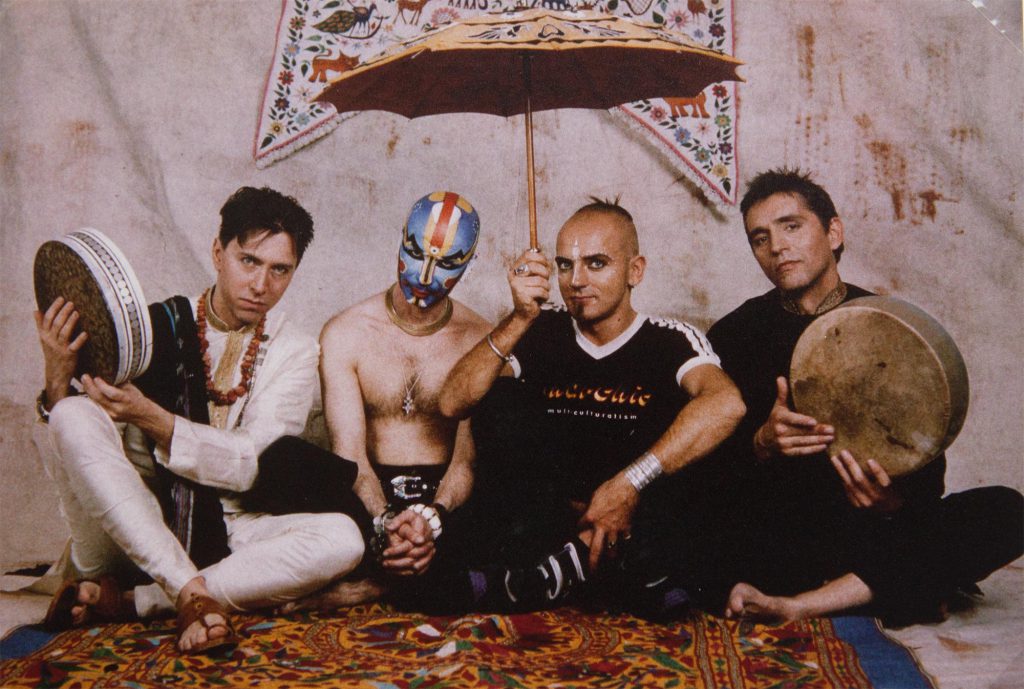
It went beyond your wildest imagination.
It totally animated me, it infected me. That’s where my passion really got started. That’s why I had the ideas and the imagination to take it to Frankfurt and turn it into music. I produced „Electrica Salsa” for Ibiza, I really wanted that song to work there. (laughing) Also when we opened club Omen, we did the first Omen party at Ku [an influential Ibiza club of the 1980s, the predecessor of Privilege], with the Frankfurt posse. That was fun! In any case, we already had a connection back then.
In addition, your mother had just opened a nightclub, or rather a bar with dance floor.
Yes, the Queen’s Pub, a small club in Neu-Isenburg. They opened in ’79.
„Mummy, I’ll stay a bit longer now.”
What did your mother think about your adventures in Ibiza? I guess she was scared that something might happen to you or you would not come back at all.
Well, I was just gone. Of course I called from Ibiza and told her: „Mummy, I’ll stay a bit longer now.”
How long did you stay when you went for the first time?
Three months. Then she said: „Are you okay, do you have everything you need?” I said: „Yeah, I’m alright, mom. I’m taken care of.” My mother passed a lot of confidence on to me in my early years. She let me to do what I wanted to do, I am thankful she did that. As I came back from Ibiza she looked at me and said: „You are quite enchanted! What happened over there my boy?” Then I told her everything and at some point she said to me: „I think you want to become a disc jockey.” I could not think of anything to reply. (laughs) All I said was: „Yes mum, that’s right, I’d like to be a disc jockey very much.” „Get started in our pub then,” she said. My father objected, as I was not yet 18. But my mother prevailed and so I started DJing at my parent’s pub. My mother was behind the counter and I was behind the ‚DJ counter‘ (laughing). And then I rocked the place – and the rest is history. (laughing)
You keep talking about your mother, but you rarely mention your father. How was your relationship with your dad?
Oh, I had a distant relationship with my father. I hardly ever saw him. He was totally absorbed in his work.
What did he do?
My parents are refugees [from the former German eastern territories]. They got to know each other relatively young at a reception center [right after World War II]. They built their whole life up from scratch. My father was a painter and also a passionate dancer, he performed Rock’n’Roll shows with my mother. Then they realized their dream of building their own nightclub. My father did everything by himself, every stone, all carpentry work. He never stopped. Looking back today, my parents showed me how to live your passion. Of course, that infected me too, back then.
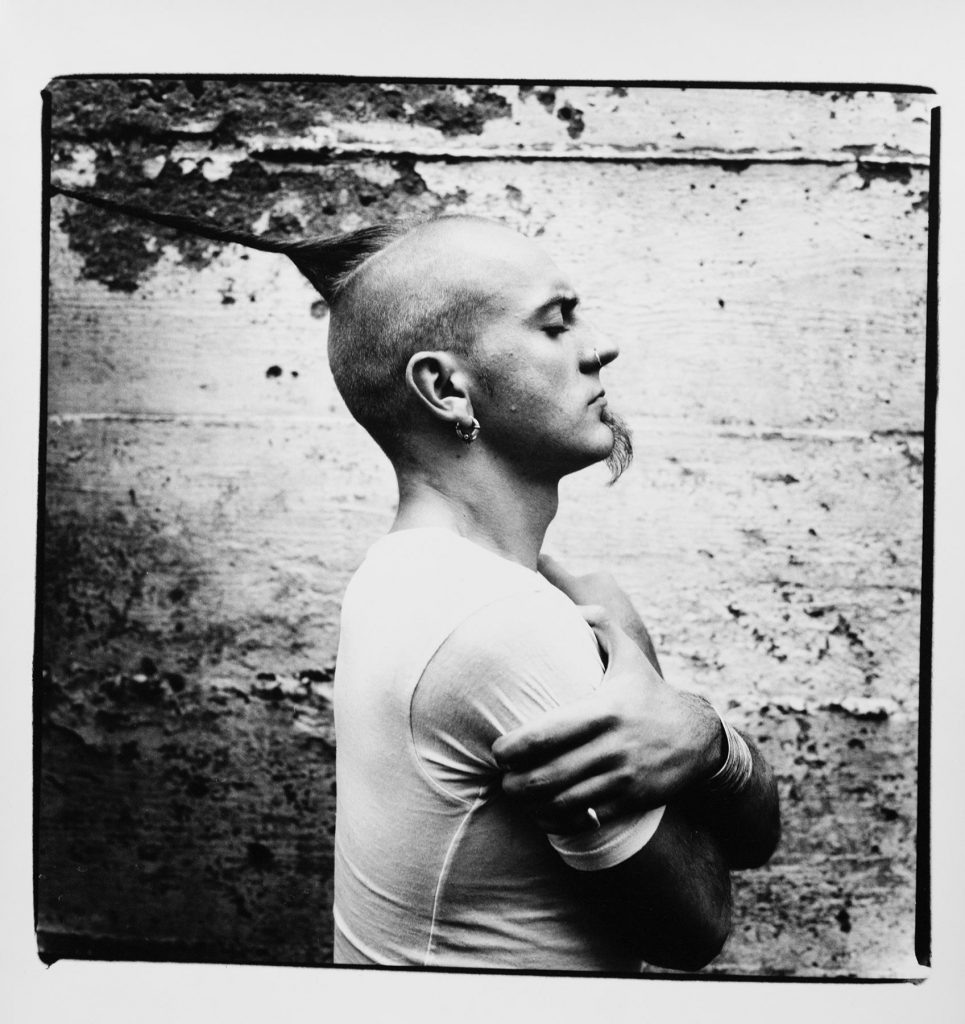
How did this fascination turn out musically?
I dared to do things because I was inspired by Ibiza. As I got back, I went to record shops, searching and finding great music I was not able to play at my parent’s pub.
What did you play there?
„Thriller” [by Michael Jackson] had just been released. My sets went from disco to Grandmaster Flash and Culture Club to Haysi Fantayzee and everything that was popular back then, mixing in some oldies. „Last night a DJ saved my life” – my mother sang along to this song. That was awesome adding just another kick to the whole thing. After the closing slot at my parent’s Saturday night, I drove to Dorian Gray. Then I spent all night on the dancefloor. My parents always finished at 1 AM. I also promoted myself a lot, I told people about my experiences on Ibiza, how much that transformed me. I told everyone: We have to go to Ibiza for the opening parties, to Amnesia and Ku. And I already brought quite a piece of our Frankfurt sound to Ibiza back then. I went to Dorian Gray or Vogue in the 80s, recording tapes and took about 50 cassettes to Ibiza’s city center, selling my tapes to every possible bar around. I already had vaccinated Ibiza quite well with our music. (laughing)
When did you first play at a big club in Frankfurt?
At Dorian Gray in ’81.
How did that happen?
This is a story I told many times. I was approached by Ulli Brenner, who was resident DJ of the small floor of Dorian Gray at the time. He watched me on the dancefloor as I set a certain mood dancing for hours. He asked if I could step in for him: „Can you DJ?” „Yes, of course I can DJ.” He opened the door for me. He went on vacation, I took over the small floor and apparently made a powerful impression. (laughs) Anyway, the manager came up to me and asked: „Don’t you want to work here?” So I took on a permanent position as the DJ of the small floor at Dorian Gray.
How many days of the week did you play over there?
Four days a week. Then there were special events, fashion shows, Formel Eins parties [a music video show on German TV], Playboy parties. I had to be there often at noon already.
„I believe our music was a mixture of New Beat and early stages of Techno. With a dash of pop of course.”
How did you assemble a set back then? In a way, it was even harder to entertain a dancefloor compared to today. There was not as much music specifically produced to make people dance.
At that time each club had its own repertoire, its own record collection. You went through the records and you put together your evening programme. There was also a lot of old music, a lot of disco, especially at the small floor. At the big floor it was different, there was much more experimentation going on. At that time Michael Münzing was playing, as well as Bijan Blum. Both Ibiza fans! Ibiza inspired many DJs back then.
How did you imagine your personal future would look like and how did you think of the future of music in general? It was impossible to anticipate techno would emerge.
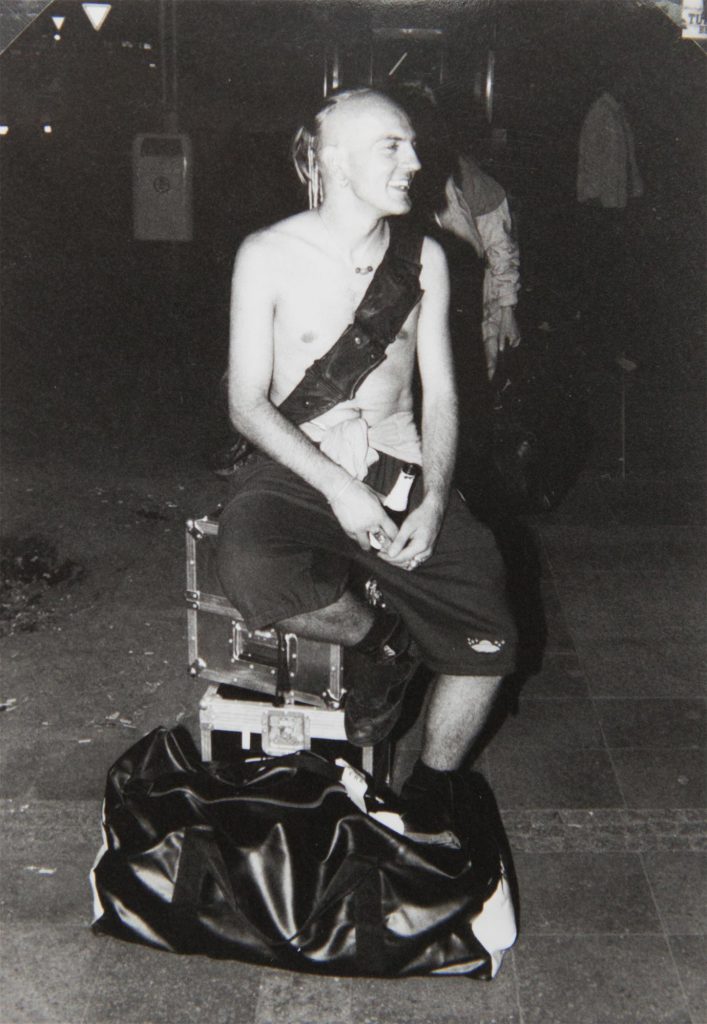
I definitely wanted to help shape it. Luckily, I got to know a couple of nice guys at Dorian Gray who were eager to experiment musically as well. We met at lunchtime, tinkering with drum machines, we did our own remixes on tape, pushing the boundaries in every way we could imagine. We just wanted to be part of it. Dorian Gray was our playground, it was a crazy lab with amazing technical equipment, like Studio 54 or Paradise Garage. Richard Long developed the sound system. To be able to go there at noon, listening to records and rework them into remixes: That really motivated us to do something of our own.
What was the first result you were satisfied with?
We approached our goal of a production of our own in tiny steps. It finally happened in 1985. „Bad News” on Bellafon Records was my first release.. At the same time, similar experimentation was going on in Chicago and Detroit, DJs also trying to produce DJ music. We did the same thing and we succeeded in doing so relatively quickly. That was also inspiring for other DJs, in Frankfurt as well as in Ibiza. Those were the mid-80s when DJs with a lot of imagination and passion contributed to redefining dance music.
How did you start to sing? How did you develop your very own vocal style between talking and singing?
Rather on a whim. As we were in the studio, I just grabbed the microphone and I started reciting some lines. I guess I was in a certain mood wanting to express myself vocally.
What did you want to tell?
Oh, just fantasy stories! That’s what I did back then, with Luca Anzelotti and Michael Münzing in the 80s. In the 90s I was working with Ralf Hildenbeutel and Matthias Hoffmann, followed by Roman Flügel, Jörn Elling Wuttke, Anthony Rother and Johannes Heil. We were pioneers, we tried a lot and did not find formulas right away. But we did a lot of daring, especially as far as the kick drum was concerned. It had to be pretty loud with reduced arrangements. I was wooed away from Dorian Gray by club Vogue, I think in ’84. In ’86, I was wooed back again by Dorian Gray and became resident DJ in the big club. In the meantime, the Belgian sound took off, New Beat. I believe our music was a mixture of New Beat and early stages of Techno. With a dash of pop of course.
The playfulness of your music and of the singing back then is still present in your sets today.
To keep on going, to take people on a journey, to tell a story musically with a touch of humor. Sometimes it can be more severe, at times psychedelic, even hypnotic. That was always important to me from the perspective of a dancer, to have the music take me along, the DJ nailing me to the dancefloor, not letting me leave. I wanted to create a certain energy with the selection of music, a communal feeling, with a dose of love and passion.
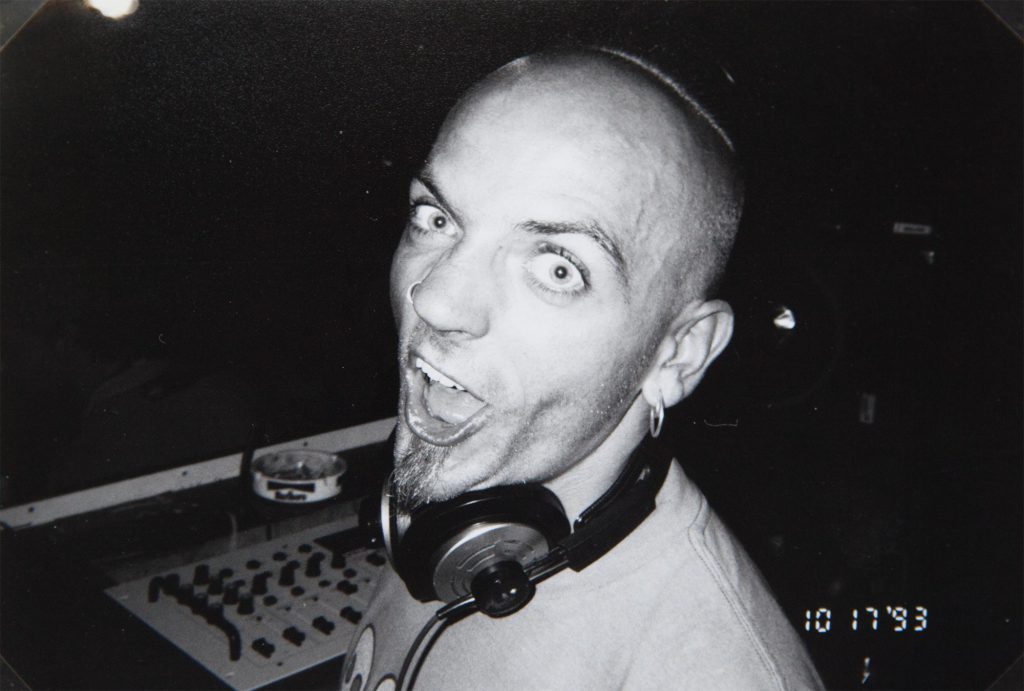
How did your DJing develop at Vogue and Dorian Gray during the course of the 80s?
At the beginning of ’88 it was quite extreme, I fully remodeled Dorian Gray as [the Industrial sound of] Front 242 took off, Nitzer Ebb played a live show, Skinny Puppy entered the scene. I’m still a big fan of Adrian Sherwood until today. I introduced the Industrial music from à;GRUMH…, A Split Second, Severed Head or The Clinic to the Frankfurt club scene. Suddenly everybody was dressed in black, wearing boots. (smiles) At some point I realized: „Oh, that’s pretty blatant. What’s going on here?” I had already in mind wanting to do something of my own. With two friends, who later became my partners, we came up with an offer to buy Vogue.
How did you even think of buying a club with your DJ schedule and your Pop act?
It took a while, but then we made the decision. I left Dorian Gray and said: „I need an artistic break.” Musically I wanted to leave Industrial behind. It was the age of House Music, especially Acid House Music. I wanted to include more House tracks in my sets. I took a longer break, almost half a year. In the meantime, we rebuilt Vogue. I suggested Omen as a possible name. We threw out the whole interior decoration of Vogue, and Omen was created in the space with the help of our friend Amir Abad, who was the architect of the project. And then in 1988, on October 18th I believe, we opened the doors of Omen.
DJs wanting to create their own club is a rare thing. Why did you feel the need to do that? It’s quite a distraction from the music and you already had an amazing home base with Dorian Gray. Why did you want to take on this task?
I guess it wasn’t enough. (laughs) I felt the time was right. I was 24. I just turned 17 when I started to DJ. At 22, I was a pop star with „Electrica Salsa” and did my own gala shows, I performed at the Arena di Verona, I met incredible great people. But as a DJ I was only playing in Frankfurt. That changed in 1988, when I had my first booking in London, at the Wag Club with Dave Dorrell, who just released „Pump up the volume” with the project M / A / R / R / S. That was the time we opened Omen.
Why did Sven Väth want to run a club in addition to his DJ career? What made Omen unique? How did Väth reinvent himself after its end in the late 1990s with Cocoon? What’s his opinion about the young techno generation with its Instagram DJs? Read the third part of our longform interview here. Learn about Väth’s take on Ibiza’s current scene in part one.
